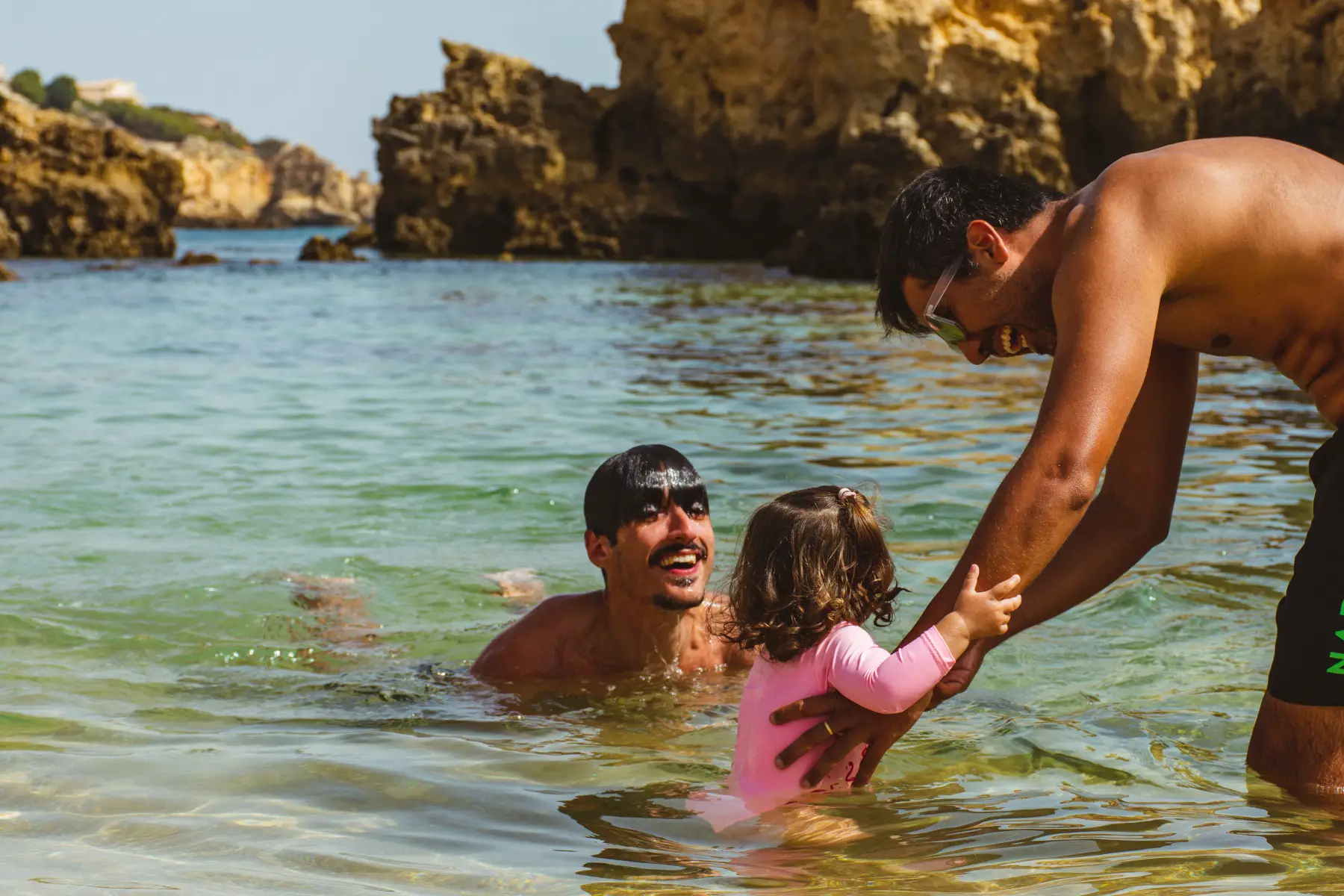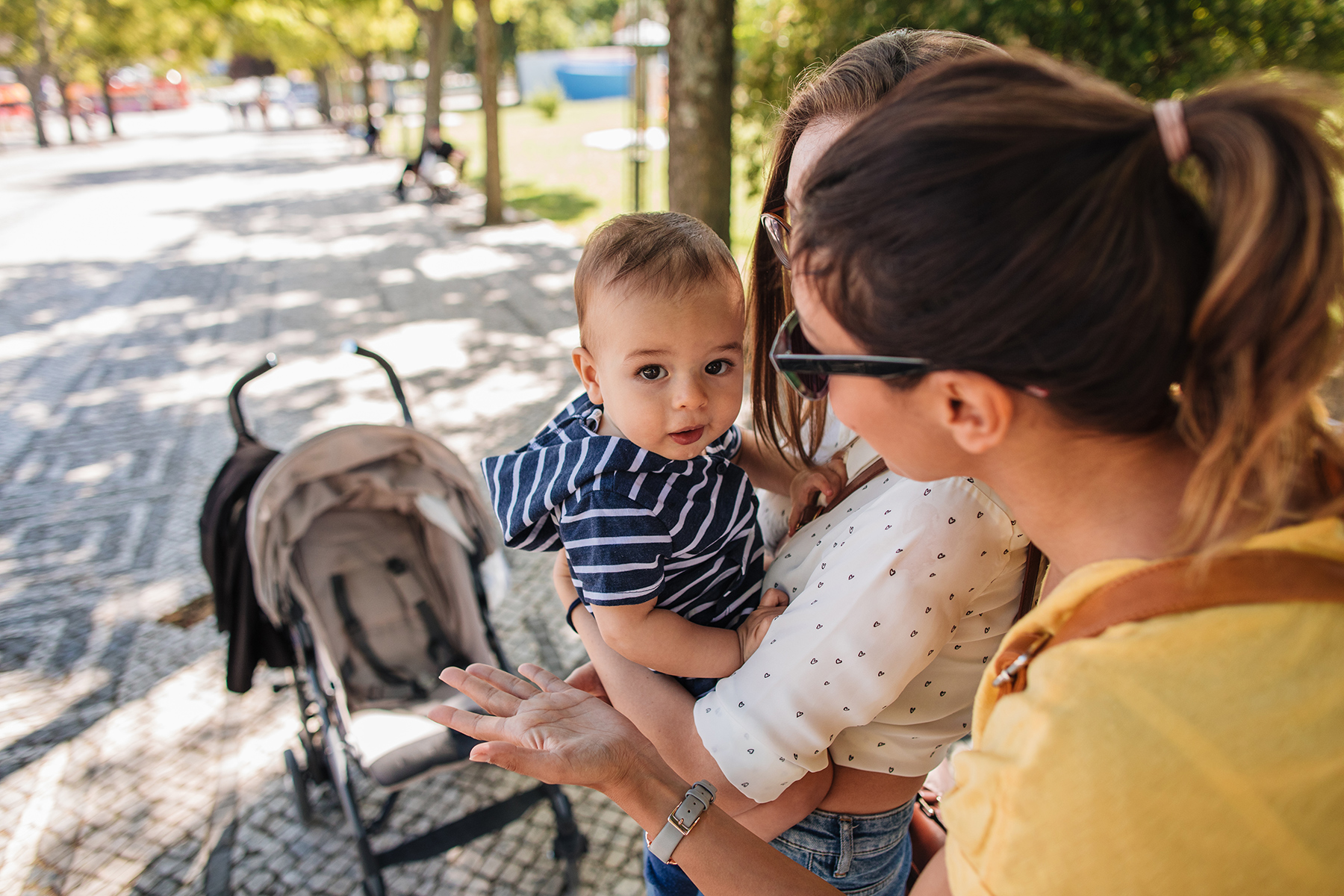The Portuguese tend to be quite attached to their families. In fact, outsiders may even observe that parents and grandparents appear to spoil and overprotect their children. And it is true to some extent. For instance, it is rare for children to walk to school alone or socialize with their friends without adult supervision until they reach their teenage years. That said, attitudes may vary between rural areas and big cities such as Lisbon and Porto.
Generally speaking, expat parents should find it relatively easy to integrate into Portuguese life, especially given that most schools provide language support for foreign students. Moreover, there are several childcare options and attractions that cater to international families.
So, if you are planning on moving to Portugal, this article will help you understand parenting and family life in the country, including the following:
- Family norms in Portugal
- Children and parents in Portugal
- Parenting in Portugal
- Families with special needs in Portugal
- Adopting and fostering in Portugal
- Grandparents and the elderly in Portugal
- Extended family in Portugal
- Family pets in Portugal
- Work and welfare for families
- Family health and wellbeing in Portugal
- Useful resources
Spotahome
Looking for somewhere to rent in Portugal? Spotahome takes the hassle out of househunting by doing the hard work for you. Their online platform lets you find, view, and book rental properties all from the comfort of your own home. Take the stress out of househunting in Portugal with Spotahome.
Family norms in Portugal
Family plays a central role in Portuguese society, and many of the country’s values come from its predominantly Catholic culture, which is still relatively present today. For a long time, the man was the sole economic provider in the family, while women were the caregivers.

Indeed, during the Portuguese dictatorship, many women were forced to stay home and do the housework. However, after the revolution in 1974, this structure slowly faded, and traditional gender roles began to shift in recent decades, with more women joining the workforce. Nowadays, Portugal has one of the highest employment rates for women with children in the EU.
Portuguese families tend to be quite large, and it is common for multiple generations to live under the same roof, or at least maintain close connections with extended relatives. Families have, on average, one or two children. That said, this number has been declining since the 1960s when it was common to have more than three children. However, the rise of immigration has slowly brought an increase in birth rates in Portugal, with 16.7% of babies being born to foreign mothers in 2022.
Most private households in Portugal consist of couples with children, followed by couples without children, individuals, and single parents. Notably, there are more single moms (86.7%) living in the country than men (13.3%).
Currently, there is no specific data on same-sex households in Portugal. However, there has been an increase in same-sex marriages and adoptions since they were legalized in 2010 and 2016, respectively. Another law introduced in 2016 gave the right to assisted reproductive treatments, such as IVF, to all women regardless of their sexual orientation or infertility diagnosis.
Family activities and attractions in Portugal
From cultural landmarks to beaches and amusement parks, there is certainly no shortage of family attractions in Portugal. Parents will often take their children to the nearest playground (parque infantil) after finishing work or during the weekend. Some also like to visit pedagogical farms, where children can interact with farm animals up close.
Come the school holidays, most Portuguese families will hit the beach. Some of the most family-friendly beaches are around the Algarve, where you will also find plenty of waterparks. Other popular activities include surfing and dolphin-watching.

Notably, while there are many attractions for children across the country, most are located within the capital. Indeed, Lisbon is full of historical sites, including museums, castles, and palaces, especially around the Sintra area. The city is also home to the Oceanário, one of the biggest aquariums in Europe, and a fun interactive science center known as Pavilhão do Conhecimento.
Families in Portugal can also take advantage of several discounts. For instance, children between the ages of four and 12 receive 50% off railway tickets, while those under four travel for free. In addition, young children usually enjoy free entry to Portuguese museums, and many restaurants serve child-size portions for lower prices. Moreover, most festivals have a special section for children’s entertainment. Needless to say, there is plenty of fun to be had for families living in Portugal.
Children and parents in Portugal
Attitudes towards children
Portuguese people tend to be kind towards small children and often step in if they see a child in danger. They also include them in most social gatherings, including weddings and local festivals.
It is also common for parents to head out to cafés and restaurants and let their children roam around freely, especially if there is a playground nearby. Indeed, children are encouraged to spend time outdoors and engage in activities such as soccer and cycling.
In Portugal, children start gaining some degree of independence around the age of 12 years, as they begin socializing with their friends without adult supervision. That said, parents will usually be around to chaperone. Some families also choose to open a savings bank account (conta-poupança) for their children as soon as they are born, which they can only access once they turn 18.
Childbirth in Portugal
The Portuguese healthcare system provides maternity care for locals and expats who contribute to social security. If you are planning on having a baby in Portugal, you can opt to give birth in a public or private hospital. Notably, while most births in the country happen in the maternity ward of a hospital, you can also choose your own midwife to assist you with a home birth.
Once you have registered at your nearest health center (centro de saúde), you will be able to access prenatal appointments for free. Alternatively, you can take out private health insurance to cover the costs of a private doctor.
After your doctor confirms your pregnancy, you will receive a pregnancy booklet (Boletim de Saúde da Grávida). This will record all your medical information throughout the pregnancy, including appointments, vaccines, and test results. You should also bring this to the hospital when you give birth.
Notably, while medical examinations are free, antenatal classes tend to be paid for. These are available at public and private hospitals and offer all the guidance you need during your pregnancy.
Childcare in Portugal
Fortunately for expat parents, Portugal ranks among the best places to raise a child in Europe and offers a wide range of childcare services.
Parents tend to enroll their children in a nursery from the age of three months to three years and then move them to a preschool until the age of six. Notably, most nurseries in Portugal are private, meaning that parents have to cover the fees. However, the government is slowly introducing free childcare options.

While preschool is not mandatory, most families choose to take advantage of these facilities. In fact, around 93% of children attended preschool in Portugal in 2020. This is higher than the Organisation for Economic Co-operation and Development (OECD) average of 83%.
Public preschools are usually free, but there are limited spots available. As a result, many expat families send their children to a private kindergarten.
In terms of childcare, parents can also opt for home-based care, such as nannies or childminders.
Schooling in Portugal
In Portugal, education is mandatory from the age of six to 18, which covers primary and secondary schools. As a parent, the first decision you will need to make regarding your child’s education is whether to send them to a public school or a private international school. Interestingly, only 12.8% of students attended private primary schools in Portugal in 2022.
Public schools are free to attend and the language of instruction is Portuguese, with English being taught as a second language. International schools, on the other hand, teach in a range of languages and charge fees. These are popular among expat parents who do not intend to live in Portugal long term.
International schools may also be more suited to older children who are more accustomed to international school systems. Younger students, on the other hand, might be able to adapt better to a local public school where they can learn the language quickly and eventually feel more at home in the community. This might be especially true if the school offers additional Portuguese support classes for non-native speakers.
Parenting in Portugal
The Portuguese parenting style
In Portugal, babies and younger children will use “mamã” and “papá” to refer to their mother and father, while older ones will say “mãe” and “pai”. It is also common to address family and close relatives in the second person, “tu”. However, some parents teach their children to use the third person “você” as a sign of respect for the older generations.
Historically, religion played a huge role in educating children in Portugal, and many of these traditional values remain. Notably, Portuguese parents are very protective of their children, and while they value self-sufficiency, they will often be around to supervise. It is also customary for the extended family, particularly the grandparents, to help with childcare.
Bringing up teenagers
Teenagers in Portugal tend to have quite a bit of freedom. For instance, they will often meet with their friends at the beach or a local café after school or during the holidays.
Although 16 is the minimum age to work in Portugal, most teenagers choose to focus on studying before getting a full-time job. Because of this, parents will often support their children until they finish their university studies and even beyond that.

Public and private health centers often have a section for youth care, which includes sexual health education and counseling. Most schools also have a psychologist on-site. However, many focus solely on career counseling and vocational guidance. As a result, most teenagers tend to reach out to their local youth center for support. According to a study on the health of school-aged children in Portugal, more teens were unhappy in 2022 (27.7%) than in 2018 (18.3%).
Parenting support and classes
New parents can access parenting classes and workshops in public health centers, private institutions, and online platforms in Portugal. These classes cover topics such as childbirth preparation, newborn care, breastfeeding, and early childhood development.
In addition, associations such as the High Commission for Migration (Alto Comissariado para as Migrações – ACM) offer support for migrant families and refugees with young children.
Expat parents will also find many network groups on Meetup, Facebook, and WhatsApp. Some of the most popular ones include Lisbon for Parents and Families Moving to (and Living in) Portugal! You can use these to connect with other parents, share experiences, or simply ask for advice.
Most schools will also have a parents’ association group (associação de pais), where you can discuss topics related to your child’s education through meetings and events.
Families with special needs in Portugal
According to the Inclusive Education Questionnaire 2020/2021 (Questionário à Educação Inclusiva), there were more than 78,000 students with special needs in Portugal that year. Most were in primary schools, and only 4.4% were in preschools. Beyond physical disabilities, there are also cases of autism, dyslexia, and hyperactivity.
Children with Special Educational Needs (SEN) can receive individualized support for their education in Portugal. For example, those attending public schools are entitled to adapted classes, learning tools, and assessments. However, there is often a lack of resources.
Alternatively, parents can choose to enroll their children in a special education school (escola de educação especial). These are usually paid for, however, the government may provide a special education allowance (subsídio de educação especial) to help cover the cost.
Adopting and fostering in Portugal
There were 185 cases of adoption and fostering in Portugal in 2021. Both single people and couples above the age of 25 can apply to foster a child. The process starts by contacting the nearest social security department. Once you have expressed interest, a session is then arranged to inform you of the conditions to become a host family.
As you might expect, restrictions are different for those wishing to adopt a child permanently. For instance, Portuguese and foreign couples, including same-sex relationships, need to have been together for more than four years before initiating the process. Meanwhile, individuals need to be over 30 years old to apply.
Applications for adoption should be submitted to your local social security office. They will then assess if you meet the necessary conditions through a series of assessments, including background checks, interviews, psychological tests, and home visits. It is worth noting that adoption is a lengthy process in Portugal, and can last up to six years.
Grandparents and the elderly in Portugal
Portugal is among the countries with the oldest population in Europe, and according to Eurostat, only 21.2% of the elderly live alone. The rest live in a couple (48.1%) or in other types of households, such as institutions and nursing homes (30.6%). Many elderly individuals also live close to their families or in the same household, which is especially the case in rural areas.

“Avó” and “avô” are the Portuguese terms for grandma and grandpa. As mentioned, the relationship between the children and their grandparents is generally close, especially if they live nearby.
Grandparents tend to have an active role in the lives of their grandchildren, often helping out with tasks such as babysitting and housework. And even if they live further away, parents will usually arrange weekly visits.
Extended family in Portugal
Extended family members, such as uncles (tios) and cousins (primos), are often present at family gatherings in Portugal.
Most Portuguese people also come from a religious background, where it is common to baptize children. In this case, the parents designate godparents, who tend to be family members like an uncle (tio) or aunt (tia), or close family friends.
Family pets in Portugal
There are more than 3 million pets registered in Portugal, with dogs and cats being the most popular choice. Most families have at least one pet.
Notably, while you can carry your pet on public transport, they will need to be on a leash or in a carrier bag. Moreover, restaurants and cafés only allow pets outside. That said, attitudes are slowly changing.
Work and welfare for families
New parents in Portugal are entitled to parental leave (licença parental), which ranges from between 120 and 150 days. In most cases, employees receive around 100% of their salary. In order to claim it, they must have contributed to the Portuguese social security system for at least six months.
In addition to this, parents can apply for a family allowance to help cover expenses such as education. Other available benefits include prenatal family allowance and single-parent allowance. You can read more about this on the government website.
Upon returning to work, mothers and fathers also have the right to flexible work arrangements, including time for breastfeeding, part-time schedules, or work-from-home days. You can read more about this in our article on parental leave in Portugal.
Family health and wellbeing in Portugal
If you are a resident of Portugal, you and your children are eligible to access the public healthcare system. Children have regular checkups from birth, which cover things like vaccinations, dental care, and nutritional healthcare. Most appointments are also free or subsidized by the state.

Notably, many people choose to supplement state medical care with private healthcare by taking out a health insurance policy. Generally speaking, this gives them the advantage of shorter waiting times as well as access to a more comprehensive range of services and English-speaking staff. You can read more about this in our article on health insurance in Portugal.
Useful resources
- ePortugal – the local government website which offers advice on raising a family in Portugal
- Grupo de Famílias Arco-Íris – a network of LGBTQ+ families in Lisbon that organizes discussions and regular meetups
- Pumpkin (in Portuguese) – an online platform that is run by a Portuguese-Dutch couple and features advice and activities for families






